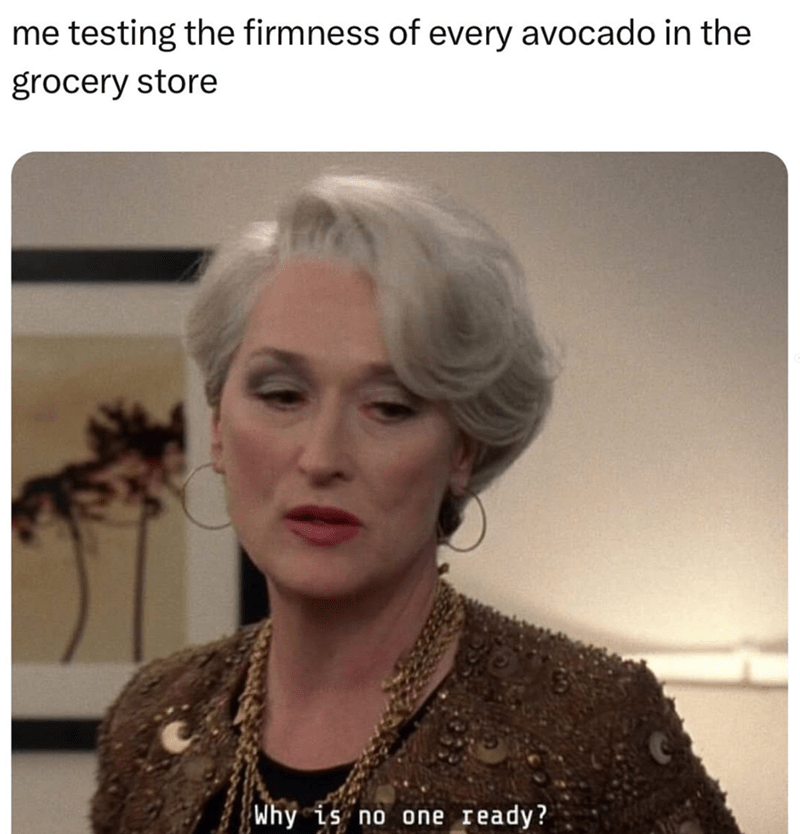TFLD3: Algorithm
Grief porn, the euro-mom fantasy, top meme
Welcome to the second installment of The FLD Three. This week: ways the almighty algorithm recently seduced me. Missed the first one? Find it here. —FLD
The algorithm is not your friend, it is your dealer—and a good one does not quit. It is always me who concedes, repulsed by the hand-feel of my phone, my wrist aching from physically supporting this block of metal and microchips that I cradle like a small, rare bird. I read in a Reddit thread about coping with grief (more on that soon) that people use Reels and TikToks to distract themselves from the torturous aftermath of losing a loved one. Between episodes of dry heaving and heart palpitations, some reach for their screens with trembling hands. If social media can produce enough serotonin to manage life’s most profound pain, imagine its effects on an easy mind. Holy shit.
Here are three ways the algorithm seduced me this week.
GRIEF PORN
The other night, I stumbled upon a Reel of a woman sitting on a hamstring machine sobbing into her hands. A text overlay explained that she was mourning her deceased husband. He was “vibrant, healthy” but succumbed to stage four melanoma six years ago. Grief still creeps up on her, even in public and unthreatening spaces like the gym.
I clicked the stranger’s profile and read dozens of her posts recounting the story of her late husband. At first, a standard health scare: doctors found and removed a cancerous mole beneath his beard, but his scans came back clean, so the couple felt lucky, splashed with a renewed sense of energy and gratitude. She describes finding his scar from the surgery attractive, evidence of a trial they weathered together. But a year later, the real nightmare begins. Days before New Year’s, he wakes up with flu-like symptoms. Soon after, he is diagnosed with melanoma, except this time it has spread to his lymph nodes, organs, and bones. Seven hellish weeks after the diagnosis, he dies, leaving behind the young wife and their three-year-old daughter.
I read through each post with the fervor of a raccoon discovering an overflowing garbage can. WHAT HAPPENS NEXT? I demanded, knowing full well it was only going to get worse, more hopeless, more inconceivably sad. The plot was tragic, but more devastating were the details she included—his half-marathon runs right before symptoms appeared; his whispered “fuck” while lying on the couch reading lab results that said the cancer was everywhere; how he saved his waning energy in those final days for evenings, just the two of them holding hands in the hospital bed talking about love and life; his final words.
I wept silently, the way people do in airports after watching YouTube videos of soldiers returning home to their dogs. I took breaks in the bathroom to catch my breath and blow my nose in private, making sure not to wake my own vibrant, healthy husband sleeping beside me. I felt the urge to extend a hand to his back, to observe his body hooked to zero machines, attached to zero tubes. I considered laying my head on his chest and letting snot leak onto his pajamas, but I did not want to explain that my midnight spiral began because I was scrolling when I should have been sleeping.
THE EURO-MOM FANTASY
If it isn’t another controversial article from The Cut. This week, the publication let us all in on the newest trend among wealthy liberals: mothers are moving to Europe! Mother Euro (okay, good name!) is a startup providing logistical and emotional support for American mothers transitioning to life in Europe. For $1,500 a year, you get relocation assistance, step-by-step checklists, mindfulness practices (oh god), WhatsApp groups, and other “exclusive content” meant to empower your journey abroad.
I clicked fast because I, one day, may also be a Mother Euro (now I hate it). My German husband has made it as clear as an alpine stream that living in Europe again is on his—now our—bucket list, ideally England or somewhere English-speaking so I do not have to go full foreigner.
In the Instagram comments under The Cut’s post, people took issue with how affluent Westerners are called “expats” while lower-income POC are labeled “immigrants.” I’d argue it depends more on motive and timeline than income and race. A wealthy white woman from Portland permanently relocating to Spain in search of a gun-free (safer), healthcare-abundant (happier) life for her and her family would qualify her as an immigrant in my book. (This particular immigrant told the writer, Miranda Rake: “In Barcelona, the streets are filled with children and families and young people and the elderly at all times of the day. All of these people are socializing and living their lives around each other, and that feels so different from the U.S.” I don’t know, sounds like a block party to me.) Whereas, if I move because my husband wants to be closer to his family and sip espresso on cobblestone more often, I would consider myself something closer to an expat.
Despite Rake doing a decent job mocking Mother Euro, co-founder Emily San José promoted the story on her socials. (I’d probably publicize The Cut’s mediocre review of my product too.) The premise goes that American mothers are fleeing to Europe for its—shall we say—amenities: safety, healthcare, and a slower pace of life. That’s fair. What isn’t fair is how the company portrays European residency as indistinguishable from a luxury vacation. “White linen, candlelit tables, a sun-drenched sailboat, impossibly blue Mediterranean waters, bocadillo de jamón”— these are word associations for a summer jaunt, not motherhood, yes, even in Europe.
I’m not a mother, but I have a suspicion that motherhood in Europe isn’t that different from anywhere else. You want happy, healthy children. You want happy, healthy relationships. You want to not lose yourself in the process of achieving either.
MIRANDA PRIESTLY AVOCADO MEME
I first encountered (and howled at) this meme months ago, but this week I’m ready to declare it my favorite of all time. If you get it you get it, if you don’t, it’s not going to be funny having it explained to you. It is clever, it is accurate, it has STAYING POWER. I channel Miranda Priestly’s signature tough love (or was it textbook narcissism?) every time I shop for avocados, pressing their pudgy bodies between my fingers, deciding which are coming home with me and which will remain in the produce section. Why is no one reaa-dyyyy? I sing in my head. One day, I’ll say it aloud to the buyer next to me. Maybe they’ll laugh. Maybe they’ll glance over at security. I’m open to either.
That’s the three! Until next time.





